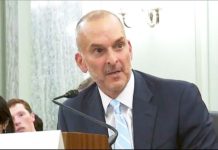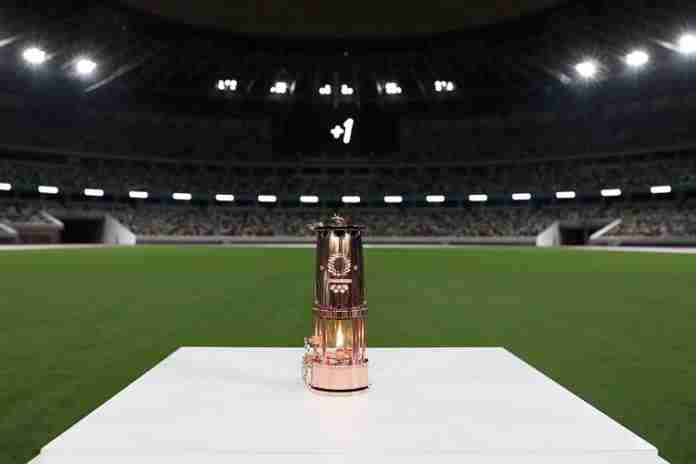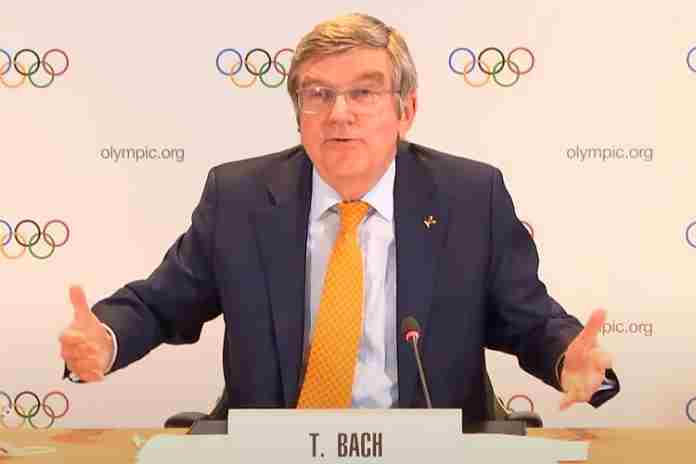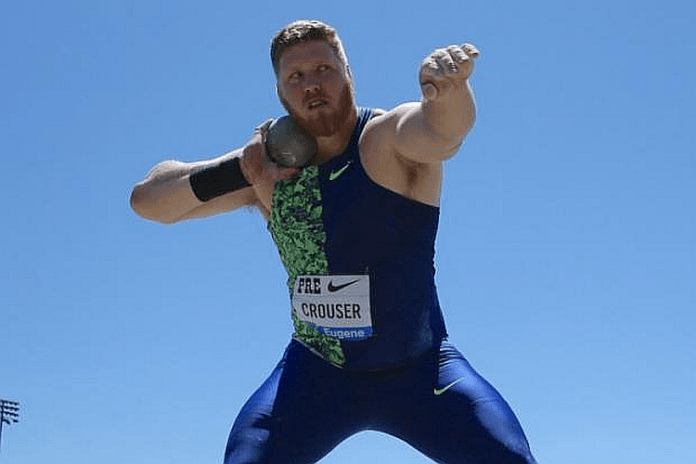(★ Friends: Wow! Now 37 donors toward our December bill for server and support costs, and we have reached 90% of our goal! If you would like to help get us across the finish line, please donate here. Your enthusiasm is why this site continues. ★)
The latest news, notes and quotes from the worldwide Five-Ring Circus:
● Games of the XXXII Olympiad: Tokyo 2020 ● Way back in 1977, Southern California Committee for the Olympic Games chair John Argue wrote that the Los Angeles bid for the 1984 Games had to take into account the $1 billion-plus loss suffered by the Montreal Games in 1976.
Argue wrote in the introduction of the Los Angeles responses to questionnaires from the International Federations: “Arrangements are to be spartan.”
After the enormous financial, logistical and aesthetic success of the ‘84 Games and the succeeding explosion in the size and cost of the Olympic Games since, no one ever thought those words would be spoken again.
Wrong.
In an interview with The Associated Press, Francesco Ricci Bitti, the Italian head of the Association of Summer Olympic International Federations (ASOIF) said:
“At the moment, we’re positive that the games will be held.
“They will be different games. But we, the federations, are open to accepting these changes. They will be spartan games, with all of the usual services reduced.
“There will be all the counter measures which we are studying sport by sport. We need to be ready to have games that won’t be COVID-free.
“That’s the situation at the moment. All of the negative things are speculation right now. In Olympic circles we are very positive. We strongly want these games.”
The moral: No matter the subject, never say never, because truth is stranger than fiction. Argue, who passed at age 70 in 2002, is smiling.
¶
In addition to all the coronavirus questions, International Olympic Committee President Thomas Bach also commented during Wednesday’s news conference on the status of the ongoing review of the “no protests allowed” section of Rule 50 of the Olympic Charter.
“We have been informed today in the Executive Board by the Chairwoman of the Athletes’ Commission, Kirsty Coventry [ZIM], about the progress in their study with the athletes worldwide. You know, they did this in two steps: there was a qualitative part and then the quantitative part, and this quantitative part is being constructed based on the advice of independent experts who know about how to organize these kind of inquiries and consultations.
“There was a great, as we have heard, international participation from around more than 3,000, if not 3,500 athletes from all across the globe, across all the Olympic sports. And now these answers will be evaluated by, and with these independent experts; they will then present the results of this evaluation to the IOC Athletes’ Commission. Then, based on these findings, the Athletes’ Commission will come with recommendations and proposals to the IOC Executive Board, mostly in April with regard to this Rule 50 discussion.”
● Athletics ● The 2015 World Champion in the 110 m Hurdles, Russian Sergey Shubenkov was alleged to have tested positive for a prohibited substance in a post on the News.ru Web site which was quickly repeated on social media.
Shubenkov, 30, refuted the charge on his Instagram account, stating:
“All information that I took furosemide, which was discovered in a [doping] sample, is brazen defamation invented by an unknown ‘source’. It never happened. Meanwhile, news feeds rushed to ardently repost this fake news without checking where it came from.
“Indeed, I received a letter from the [Athletics Integrity Unit]. It was not about furosemide at all; I cannot disclose the details of this confidential letter due to legal concerns. I will only emphasize that I am not subjected to any restrictions and train as normal.”
The AIU’s Twitter feed has not mentioned Shubenkov at all.
● Biathlon ● A long-awaited report on possible pro-doping activities by former President Anders Besseberg (NOR) and Secretary General Nicole Resch (GER) of the International Biathlon Union was published on Thursday.
The report of the External Review Commission “concluded that both Mr Besseberg and Ms Resch have cases to answer for breach of the IBU’s rules, based on their apparent protection of Russian interests, particularly in the anti-doping context, without good justification.”
The publicly-posted version of the report is clear:
“This final report of the independent IBU External Review Commission (the Commission)
identifies what the Commission considers to be evidence of systematic corrupt and
unethical conduct at the very top of the IBU for a decade (2008 to 2018) and more, by a
president (Anders Besseberg, IBU President 1993 to 2018) who appears, in the view of
the Commission, to have had no regard for ethical values and no real interest in protecting
the sport from cheating. Enabled by a complete lack of basic governance safeguards that
left integrity decisions in the sole hands of the President and his allies on the IBU Executive Board, with no checks and balances, no transparency, and no accountability
whatsoever to keep them honest, Mr Besseberg’s proclaimed commitment to clean sport
was, in the Commission’s view, a charade. …
“The long list of proven doping cases that is set out at Section 6A.4 of this Final Report reveals not only that blood doping and steroid abuse were widespread within the Russian national biathlon team in the period 2008 to 2014, but also that the Russian conspirators intervened at every stage to cover up that doping and to enable the cheating to continue.”
Although redacted in parts, the report logs significant details of how Besseberg and Resch assisted Russian athletes in avoiding doping positives, including testimony from Dr. Grigory Rodchenkov, the former head of the Moscow Laboratory for the Russian Anti-Doping Agency who was at the center of the Russian doping program.
The report also notes significant concerns over funds received by Besseberg from Russia, with the amounts redacted; these have been estimated in news reports as up to $300,000, along with sexual favors.
Another section notes how Resch was “groomed” by Russian sports officials through gifts and extra attention to help support Russian athletes entwined in the doping process, including potential positive tests prior to the 2014 Olympic Winter Games in Sochi (RUS).
The Russian Biathlon Union apparently also tried to “buy” votes in the 2014 IBU elections, but this was not followed up with any investigation or sanctions. In addition:
“The [World Anti-Doping Agency] I&I investigation report stated that there were reasonable grounds to suspect that at the 2016 IBU Congress members of the Russian delegation offered and potentially paid unknown IBU Congress members between €25,000 and €100,000 each to vote in support of their bid to host the 2021 World Championships in Tyumen.”
Near the end of the report and before a 23-page section that was completely redacted, the report includes a comment on the holding of the 2018 IBU World Championships in Russia, despite the overwhelming evidence of state-sponsoring doping there:
“Once again, the facts set out in this section of the report repeat the clear pattern of Mr Besseberg [redacted] doing everything possible to stifle debate and avoid holding Russia to account for its doping misconduct. Once again, there is no evidence that they truly cared about a clean sport, or about the concerns raised by their athletes, coaches, and even their main media partner, the EBU.”
Both Besseberg and Resch are the subjects of continuing criminal investigations in Norway and Austria, respectively, and both have denied any wrongdoing; no charges have been filed against either.
The report turns further decisions regarding biathlon over to the IBU’s independent Biathlon Integrity Unit.
● Football ● FIFA declared that the process to select the cities and venues for the 2026 FIFA World Cup in Canada, Mexico and the United States would be completed in 2021, if the pandemic conditions allow.
Individual meetings with the interested sites will begin in February (maybe), with site visits in July (maybe). The candidate cities include:
● Canada: Edmonton, Montreal, Toronto
● Mexico: Guadalajara, Mexico City, Monterrey
● United States: Atlanta, Baltimore, Boston, Cincinnati, Dallas, Denver, Houston, Kansas City, Los Angeles, Miami, Nashville, New York/New Jersey, Orlando, Philadelphia, San Francisco, Seattle, Washington, D.C.
The 2026 World Cup will be the first under the new format of 48 teams.
● Gymnastics ● USA Gymnastics announced a 2021-25 agreement with FloSports, the ubiquitous online channel for Olympic (and other) sports to show numerous events not now available:
“Beyond providing enhanced access to USA Gymnastics Premier Events, FloSports’ content will also include rarely-featured access to events across all disciplines, and never-before-broadcast grassroots events featuring some of the best up-and-coming athletes in the country. Scheduled programming will include various state and regional championships, Level 9 Eastern & Western Championships, National Elite Qualifiers, USAG Development Program Championships, USAG Collegiate Championships, and numerous Rhythmic, Trampoline & Tumbling, and Acrobatic events. Programming will be available through FloSports’ dedicated gymnastics channel, FloGymnastics.”
There’s money in this for USA Gymnastics, which also announced where it will be spent:
“As a key part of the partnership, FloSports and USAG have committed to making a significant annual investment directly toward supporting athlete health and wellness initiatives. FloSports believes in building a supportive infrastructure for young athletes and is committed to assisting with their development by providing additional funds to augment existing USAG programs. This year, the funds will be used to bolster USA Gymnastics’ existing mental health programming by increasing awareness around mental health, providing additional services for National Team members and providing educational resources for the larger gymnastics community.”
● The Last Word ● Olympic critics will cringe at the news that the Hungarian Olympic Committee voted on Thursday to explore the possibility of a bid for the 2032 Olympic Games.
Budapest had been an interesting candidate for the 2024 Games, but its withdrawal due to the threat of a public referendum led directly to the agreement to have Paris host the 2024 Games and Los Angeles to be host in 2028.
In the meantime, Budapest has been one of the capitals of Olympic sport, hosting major events including the FINA World Aquatics Championships in 2017 and will be the host of the World Athletics Championships in 2023.
This adds to a long list of countries which are interested in 2032, including Australia, Germany, India, Indonesia, Qatar, the Netherlands, Turkey and possibly multi-city bids from China and North and South Korea. To their dissatisfaction, even naysayers will conclude that’s a good sign for the future of the Games.
You can receive our exclusive TSX Report by e-mail by clicking here. You can also refer a friend by clicking here, and can donate here to keep this site going.
For our 709-event International Sports Calendar for 2021 and beyond, by date and by sport, click here!



























